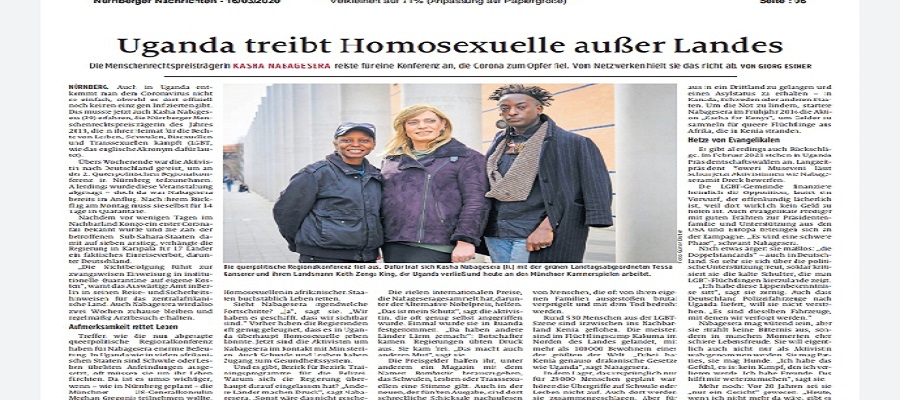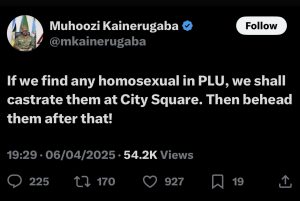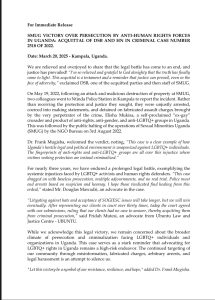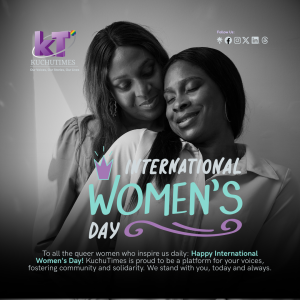Human rights award winner Kasha Nabagesera traveled to a conference that fell victim to Corona. It didn't stop her from networking.
By Georg Escher
Even in Uganda, it is not so easy to escape the corona virus, although officially there is not yet a single infected person. Kasha Nabagesera (39), the Nuremberg Human Rights Award winner of the year 2013, who has fought for the rights of lesbians, gays, bisexuals and transsexuals in her home country (LGBT), had to find out now. The activist traveled to Germany over the weekend to attend the 2nd Queer Political Regional Conference in Nuremberg. However, this event was canceled - but Nabagesera was already approaching. After her return flight on Monday, she herself has to be in quarantine for 14 days.
After a first Corona case became known a few days ago in the neighboring country of Congo and the number of sub-Saharan states affected rose to seven, the government in Kampala imposed a de facto entry ban on 17 countries, including Germany. "Failure to do so will result in mandatory admission to institutional quarantine at your own expense," warns the Federal Foreign Office in Berlin in its travel and security advice for the Central African country. Nabagesera will also stay at home for two weeks and receive regular visits to the doctor.
Attention saves lives
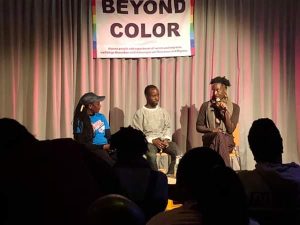
Meetings like the now canceled queer political regional conference are of enormous importance for Nabagesera. In Uganda, as in many African countries, gays and lesbians are exposed to the worst hostility, and they often have to fear for their lives. It is all the more important if - as planned in Nuremberg - the US Consul General Meghan Gregonis wanted to participate. International attention can literally save lives in African countries.
Does Nabagesera see any progress? "Yes," she says. "We managed to be visible." Before that, the government had denied often enough that there could even be homosexuals in Uganda. Now the activists around Nabagesera are in contact with ministries. Gays and lesbians also have access to the health system. And there are, district by district, police training programs. Why did the government agree to this? "Other countries are putting pressure on us," says Nabagesera. "Otherwise it wouldn't have happened."
The many international awards that Nabagesera has collected, including the Alternative Nobel Prize, help. "This is my protection," says the activist, who has been attacked often enough. She was arrested once in Rwanda. "Other countries made noise there": ambassadors came, governments put pressure on them. She was released. "It also encourages others," she says.
The prize money helped her to publish, among other things, a magazine called Bombastic, which gives a voice to gays, lesbians or transsexuals. Also in the new, the fifth edition, horrible fates can be read there and shocking photos of people who are often expelled by their own families are brutalbe beaten up and threatened with death.
Around 530 people from the LGBT scene have now fled to neighboring Kenya. Most of them ended up in the Kakuma refugee camp in the north of the country, with more than 100,000 inhabitants one of the largest in the world. "Kenya has just as draconian laws as Uganda," says Nabagesera.
In the camp, which was originally only planned for 23,000 people, the attacks on gays or lesbians do not stop. They are beaten up there, too. But for many, it's the only way to get to a third country and get asylum status from there - in Canada, Sweden, or other countries. To alleviate the plight, Nabagesera launched the "Kasha for Kenya" campaign in spring 2016 to raise funds for queer refugees from Africa who were stranded in Kenya.
Agitation by Evangelicals
However, there are also setbacks. Presidential elections are due in Uganda in February 2021. Long-term president Yoweri Museveni is already letting activists like Nabagesera throw dirt at her. The LGBT community secretly finances the opposition, is an accusation that is obviously ridiculous because there is really no money to be obtained there. Evangelical preachers with good connections to the presidential family and support from the USA and Europe are also taking part in the campaign. "It's going to be a difficult phase," Nabagesera said.
Something else annoys her immeasurably: "the double standards" - also in Germany. As much as she is happy about the political support, she clearly criticizes the cold shoulder that is shown to LGBT refugees in this country. "I'm fed up with lip service," she says angrily. Nor does she want to understand that Germany is delivering police vehicles to Uganda. "It's the same vehicles that we're chasing."
Nabagesera may be angry, but she doesn't exude bitterness, but rather sheer joy of life in some moments. She doesn't really want to be perceived as an activist either. She likes parties, she likes dogs. "I feel like it's not a fight I'm going to lose. I have friends. It helps me keep going," she says. Even more: 20 years ago, she was "just a face". "Today, when I am no longer there, there are other faces too."

